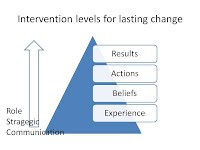Those who follow this blog already know of my great respect for the model that is the National Writing Project. The work done through this network of educators has been frequently referred to as professional development that works in that it affects a lasting change in teacher practice over time.
This summer, in a short presentation on working with professionals across a generational divide (four generations, the largest cross-generational grouping, now work side by side) I was exposed to the simple graphic below as an explanation for why certain generational groups approach their work differently.
It immediately resonated as a model for the failure of most of the professional development in schools to affect a lasting change.
It also offers a strong argument for why the Intensive Summer Institute, and the ensuing network of teaching professionals, has proven to impact student learning.
The chart maintains that experiences affect our beliefs. Those beliefs influence our actions which ultimately determines results.
Most professional development only acts on the top two tiers. "Do intervention a, b, or c and you will get prescribed results." The intervention does not 'take' because nothing has been experienced which will change beliefs. Without ongoing support for new strategies, the teacher does not have enough experience to change beliefs and falls back on old assumptions. When the first initiative fails, a new approach is introduced.
The experience of most teachers has built the belief that "this too shall pass." We need only wait out the current reform as another one will surely replace it.
Conversely, the teachers of the Invitational Summer Institute are immersed in experiences which affect their beliefs about practice. They apply theory to practice, experience heightened engagement from learning from each other, examine student work across time and curriculum, and, most importantly in understanding how writing happens, write with an eye toward publication for a valued audience. Over the period of a month or more, teacher create a collaborative, respectful learning environment of sharing practice, theory, and the writing life.
It is these combined experiences that teachers most often describe as 'transformational.' The combined experience of the Institute leads teachers to the belief that their work is worthy of study, reflection, and revision--and that they can take charge of these habits of mind.
If we are to believe the model pictured in the graphic, the culture of the teaching profession must change. Changing the experience of teachers from one of subservience to empowerment will result in classroom teachers who can enact substantive and lasting reform on a classroom by classroom basis.
